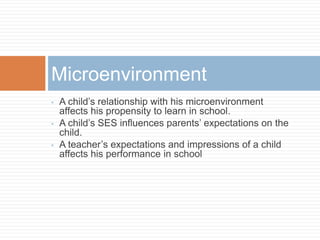
2 group presentation compiled minani microenvt edited
- 1. • A child’s relationship with his microenvironment affects his propensity to learn in school. • A child’s SES influences parents’ expectations on the child. • A teacher’s expectations and impressions of a child affects his performance in school Microenvironment
- 2. Bronfenbrenner’s Bioecological Theory of Development “Bio”: influence of genetic makeup on development physical traits temperament “Ecological” refers to the environmental influences Microsystem Mesosystem Exosystem Macrosystem Chronosystem
- 3. Chronosystem Macrosystem Exosystem Mesosystem Microsystem Child • most powerful influence on development • parents, teachers and peers • interactions between the elements of the microsystem • relationship between parents and teachers Bronfenbrenner’s Bioecological Theory of Development Levels Involved
- 4. BRONFENBRENNER’S THEORY Microsystem – Parents Problem • Parents do not seem to care for Jeremy, and blames each other for his poor grade Theory • Parents constitute child’s microsystem • Most powerful influences on child’s development • Authoritarian style of parenting • Unresponsive and detached from the child • Negligent Solution • School can organise talks that focuses on parents’ and teachers’ roles on a child’s development
- 5. Problem • Teachers hurled insensitive and hurtful remarks at Jeremy • Inflict further emotional damage • Encourage negative self concept Theory • Teachers constitute a child’s microsystem • Crucial source of support • Source of motivation and acceptance Solution • Understand student’s situation • Scolding should be done tactfully BRONFENBRENNER’S THEORY Microsystem – Teachers
- 6. Problem • Jeremy is ostracized by his peers in school Theory • Peers constitute a child’s microsystem • Provide emotional support • Allow development of social skills • Gives a sense of identity Solution • Teachers could encourage interaction • Talk to the class • Incorporate interactive activities or games during lessons BRONFENBRENNER’S THEORY Microsystem – Peers
- 7. Problem • Form teacher made repeated attempts to speak with Jeremy’s parents, but failed to contact them • Parents are too busy Theory • Mesosystem poorly established • Ineffective communication between teacher and parents • Adversely affects child’s development Solution • More frequent meetings • More effective communication • Interest of child as priority BRONFENBRENNER’S THEORY Mesosystem
- 8. Problem • Parents are working professionals and seem to have very high expectations for Jeremy Theory • Socio-Economic Status (SES) • Parents with middle or high socioeconomic status (SES) often lack the time and energy to fully invest in their child’s preparation and performance in school (Ramey & Ramey, 1994) • Child feels neglected, and have no sense of belonging • Child may become withdrawn Solution • Help parents realize that they need to invest more into their child's development • School can organise talks that focuses on a child’s needs and what parents should do Socioeconomic Status (SES)